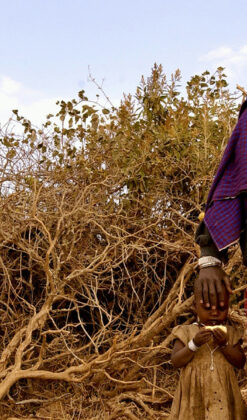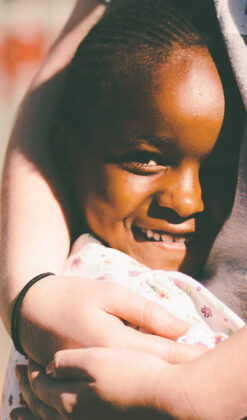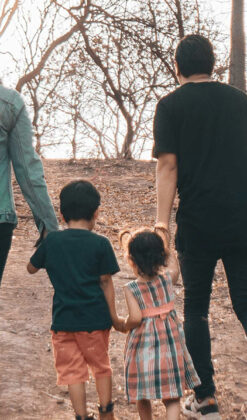By Brandon Stiver. Learn more about Brandon here and get help to transform your orphanage here. This blog post is the first in a four-part series.
“Go run an orphanage in Africa.” These were the words that reverberated in my mind as I worshiped at my church. It was 2007, and the megachurch I attended in Southern California was enraptured by the missional movement. As a college student attending the church, I was “on fire,” or whatever Christian-ese word people in the mid-2000s might have used.
These words about going to run an orphanage had actually been returning to me each of the last few church services. As I stepped into the service on this particular Friday, which happened to be Father’s Day, the notion was front and center and the impression as strong as ever. While I’ve long since forgotten the content of the sermon overall, the preacher that day managed to work in a Father’s Day element couched within talking about a recent trip to Africa. He said, “The AIDS epidemic in Africa is huge, but it’s led to an even worse epidemic, and that’s children growing up without fathers.”
Light bulb.
I began a year of prayer and discernment, sharing this calling with trusted friends, family and advisors. Over and over, I felt confirmation that this was indeed what God was leading me to. I would be joining the long line of Christians who have served God by working in orphanages. George Müller, Mother Teresa, me. (Did I mention I was young and just a tad bit pretentious?)
There is a long tradition of orphanages that goes largely unquestioned within much of Western Christian society. Have you ever heard someone listing off cultural institutions that Christians were the first to establish? It sounds like this: “Christians started the first schools, they established the first hospitals and the first orphanages and…” What we’re trying to say is that Christians, out of mercy and love for their neighbor, developed needed institutions to promote human flourishing. That’s great; we should do that. That’s what I thought I was stepping into.
Here’s the thing, though. When we establish institutions or services, we need to have a correct understanding of what need we’re fulfilling. We establish schools, because people need education. We establish hospitals, because sick people need healing. We establish orphanages, because orphans need… what?
If you answered shelter or food and water or protection or some other need within Maslow’s hierarchy, then you’re right. Orphans, and all children, need those things. However, if these things are the fullest extent of our answer, we will have missed the fundamental need that makes an orphan an orphan. A hungry person needs food; a houseless person needs shelter; an orphan needs parents. That’s what they lack.
To my 21-year-old self, this was not a consideration—even though I myself grew up in a family and in an evangelical culture that idolized family in many ways. I assumed that what AIDS orphans in Africa needed was orphanages. Family didn’t even cross my mind. I read James 1:27 the same way an entire charitable industry around orphan care seems to have read it for the last thirty years: “True and undefiled religion before God the Father is this, to look after orphans in their distress and to keep oneself untainted by the world.”
Here’s the thing, though; that isn’t James 1:27! The passage actually says, “True and defiled religion before God the Father is this, to look after orphans and widows in their distress and to keep oneself untainted by the world.” Orphans and widows are both missing family—in particular, they’re both vulnerable in a patriarchal society because they’re missing a male head of household. The mention of orphans and widows together, not only in James 1:27 but throughout Scripture, is telling us that we need to care for vulnerable families. Where did we get the notion that the best way to care for fatherless children would be to remove them from their single mothers and other family members?
According to the United Nations, there are 140 million orphans throughout the world. If we’re not careful, we can misunderstand this statistic, because international law’s definition of an orphan is different from our cultural understandings of orphanhood. We hear “orphan” and think of Oliver Twist. But most of those 140 million children are single orphans, meaning they’ve only lost one parent. About 15 million children have lost both parents; 125 million still have a living parent. Losing one parent does create vulnerability, and these children do have needs. At the same time, they also have families, and most of them live with their families. Those families need opportunities and supports just like my family does.
Perhaps the best way to live out James 1:27 is to care for both single orphans and their single parents. For orphans who have lost both parents, we can work to give them a loving parent through extended family or adoption.
Back in 2007, I was completely oblivious to all this. I was earnestly seeking God, trusting for Him to guide me, tapping into other Christians, devoting myself to prayer, and I was nonetheless oblivious. My first year of seeking God culminated in my first short term missions trip to Africa, where I spent two weeks at an orphanage in 2008. The fervor I had felt in that California worship service was nothing compared to the raw emotion of visiting an orphan boy that I had been sponsoring and walking the roads of Moshi, Tanzania.
I returned to California and shouted it from the rooftops: I was called to run an orphanage in Africa!











